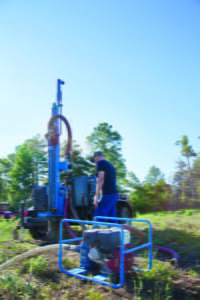4 Things to Consider Before Deciding to Drill
Can you drill your own water well? The short answer is yes — if you have the right equipment. However, there is important information to consider before you take on a DIY water well drilling project. Whether you’re looking at drilling a personal well in your yard or a community well in a rural area, understanding the process and potential challenges can help you decide if you can do it yourself or if you should invest in a professional. Here are four things to consider before deciding to drill your own water well:
1. What are the local regulations?

The number one question: Is it legal to drill your own water well? There isn’t a one-size-fits-all answer to this question. Some counties and states allow water well drilling in certain cases, whereas others ban the practice altogether. Contact your local water resources department to determine the requirements for permits and licenses in your area. While the website might be a good starting source for information, always check with local county and city agencies for further permit requirements as well. The local water resources department may also be able to give you an idea of where aquifers are located, which can help streamline the drilling process if you aren’t sure where to start.
2. Is there an aquifer nearby, and what drill do you need to reach it?
One of the main difficulties in water well drilling projects is locating an aquifer in a safe well location with stable ground and a low risk of contamination. Some aquifers are located close to the ground’s surface, but they can also be below clay, thick soil or a layer of bedrock. Choosing a water well drill requires knowing at what depth the water can be found and what soil types you need to drill through to reach the aquifer. Some drilling projects even require a down-the-hole hammer to break through tougher rock formations. Even if state or county regulations allow for DIY water well drilling, it might not be practical in certain soil conditions or if the aquifer is too deep beneath the surface. A large and expensive drilling rig may be necessary and hiring a professional may be more economical.
3. What training is needed and available?
If you do find that the local regulations allow for water well drilling, you’ve found an area where you can reach a safe aquifer and you’re interested in continuing with the project, it’s important to have the proper training. While water well drills are often straightforward to use, having training from a seasoned professional or the drill manufacturer increases the chances of success for your drilling project. Lone Star Drills offers training options with the purchase of a water well drill. This training can be a half or full-day training at our facility. Maintenance videos are also available on the Lone Star Drills YouTube page to keep your drill in good working condition.
4. What additional equipment do you need for a successful drilling project?
Before deciding whether or not to drill a water well yourself, take a look at the equipment you’ll need. Lone Star Drills has a mobilization checklist available that outlines what equipment and items might be needed for water well drilling with an LS100 drill, though the general list is applicable in most water well drilling circumstances. This list contains everything from shovels to gas to drilling mud. And, while the mobilization checklist can give a good overview of what equipment might be needed, additional tools might also be necessary, such as bits, tripods or even double braided rope. Are you ready to make this much of an investment? Will you use the equipment again for future projects?
The Whole Project
While DIY drilling might seem like a cheap and easy alternative to hiring a professional, making sure you have a full understanding of state and local regulations, where a safe aquifer is located, what training is necessary to complete a drilling project and what additional equipment might be necessary can help you get a better understanding which drilling option is best for you. If you’ve determined it’s legal and practical to proceed with a DIY water well drilling project, contact the professionals at Lone Star Drills today! We’ll help you determine what equipment is needed for your water well drilling project and provide training for the rig you choose.